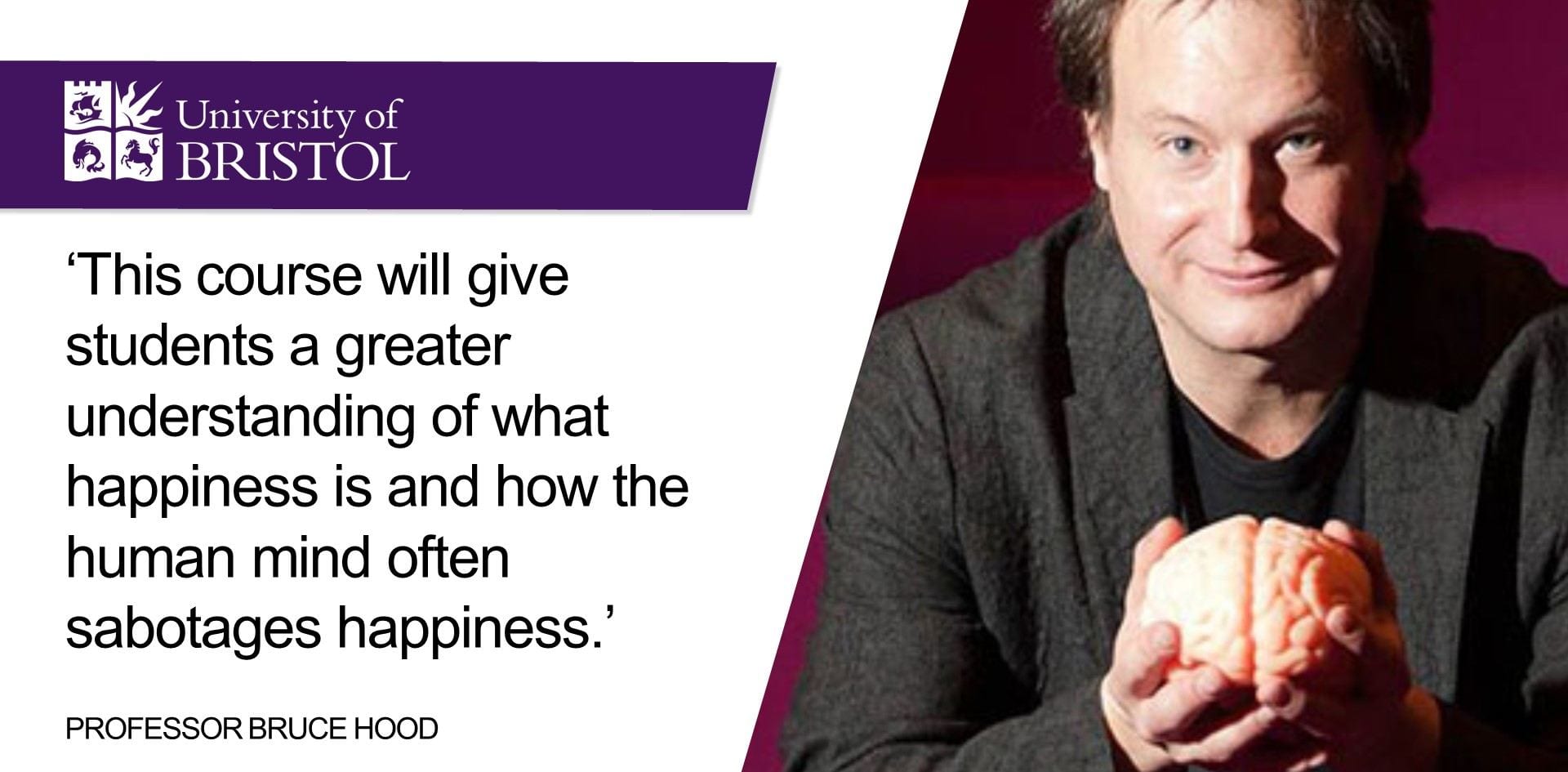Bristol became the first UK university to launch a ‘Science of Happiness’ course in 2018, designed to teach students a set of science-based strategies for living a more fulfilling life. It’s being led by eminent psychologist Professor Bruce Hood, who has carried out world-leading research into how the brain works and how human’s think.
Here’s his top 7 Happiness Hacks for International day of happiness [19 March]:
The course draws on the latest results in psychology and neuroscience to get to the root of what happiness is and how to achieve it, as well as teaching tangible practices which students can apply in their everyday lives. It’s being led by eminent psychologist Professor Bruce Hood, who has carried out world-leading research into how the brain works and how human’s think.
The Science of Happiness (SoH) course has been an extremely popular voluntary 10-week lecture series with over 800 students signing up in the first year. The course combines weekly lectures with weekly happiness hub-meetings run by undergraduate senior students who meet with 6-8 attendees to discuss mental health and well-being.
Professor Hood said: ‘Feedback on the course has been extremely positive. On measures of mental well-being, those who took the course maintained their levels of well-being over the 10-week period leading up to exams, whereas those in the waiting list control group dropped significantly on mental well-being scores over the same period.
This evaluation tells us two things: 1) the first-term is a time associated with reduced mental well-being over the 10-week period for students, and 2) those who attended the course proved to be more resilient.’
It comes amid growing concerns around the mental health and well-being of students, with 94 per cent of universities experiencing a sharp increase in the number of people trying to access support services (IPPR Report – Sept 2017). The course is one part of Bristol’s wider approach to improving wellbeing and pastoral care across the University. Bristol’s new course was inspired by Yale University’s highly-successful ‘Psychology and Good Life’ course – the most popular in its history, with one in four students enrolling.
‘Thank you so much for this inspiring course. It came just at the right time for me as I returned to my studies to reassure me that ‘hiccups’ are normal but to always persevere through to make your dreams come true, knowing people around you care, no matter how hard it is to love oneself at times(!)’ Student taking the Science of Happiness course.
Classes address a series of core issues such as whether happiness is in the genes and can really be changed, how our minds distort happiness, the role of culture in happiness, pursuing experience rather than possessions and how to reset happiness levels. Alongside the theory, students will also learn a variety of exercises to practice and reflect on how these effect happiness-levels through weekly Happiness Hubs.
‘Most people think that the path to happiness is success in jobs, salaries, material possessions, and relationships. While these goals are associated with happiness, they do not necessarily guarantee happiness and indeed, the relentless pursuit of these may actually contribute to unhappiness.’ Professor Bruce Hood.
“The course is aimed at all students and not just those who might identify as having challenges with their wellbeing. Ultimately, the aim of this course is to give students a greater understanding of what happiness is and how the human mind often sabotages happiness. Greater awareness amongst the student body will equip students to pre-empt and improve the mental health of themselves and others.”
Deputy Vice-Chancellor and Provost, Professor Judith Squires said: “This new course is pioneering in the UK. We hope it will be hugely beneficial to our students, not just during their time at university but throughout their lives.
“It’s an example of how our own research can directly benefit the wellbeing of our community, equipping them with the personal skills to thrive and grow in an increasingly complex world. This course is linked to our Bristol Futures initiative, which offers a range of courses and events to support our students’ wellbeing. We look forward to hearing students’ feedback on the course and to working in partnership with our students to develop it further in future years to help them flourish.”


